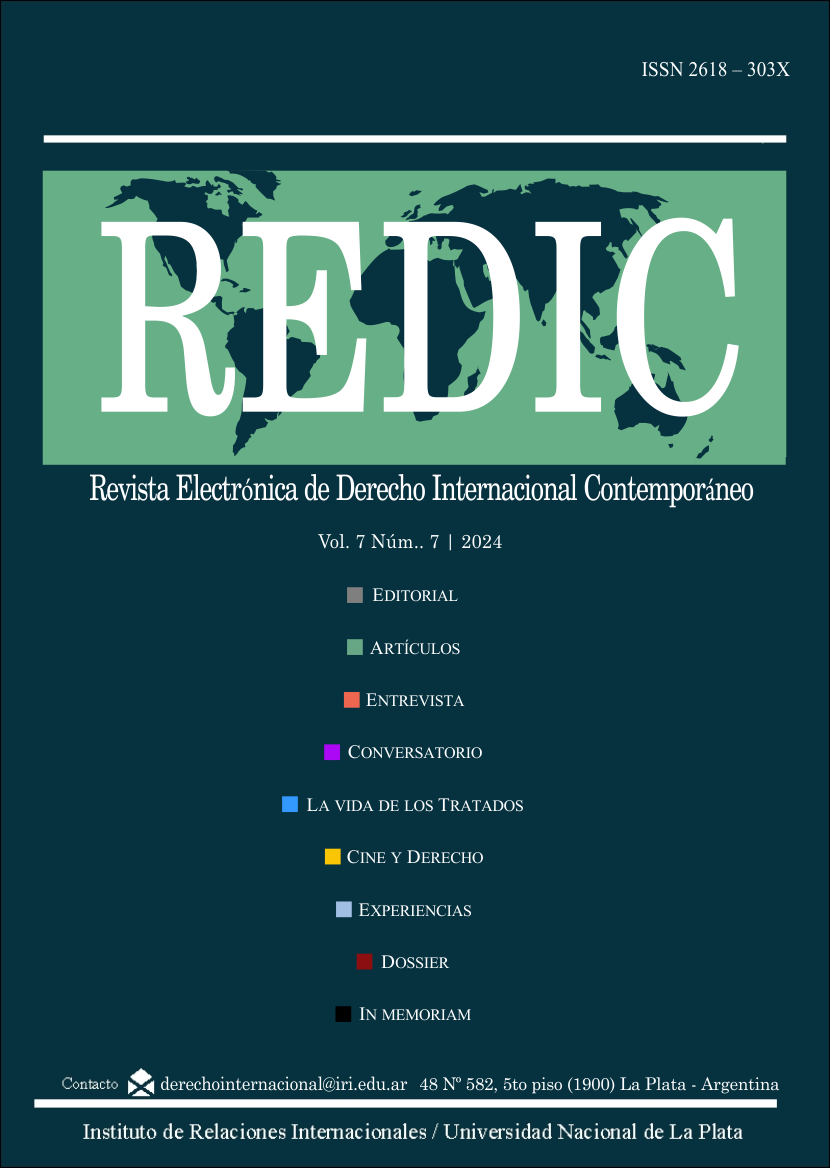Las obligaciones erga omnes como piezas de la construcción de relaciones justas y de comunidad
DOI:
https://doi.org/10.24215/2618303Xe071Palabras clave:
obligaciones erga omnes, solidaridad, comunidad internacional, moral, derecho internacionalResumen
El reconocimiento de las obligaciones erga omnes en la jurisprudencia y la doctrina son consideradas como revolucionarias, debido a cuán diferentes resultan ser sus dinámicas en comparación con aquellas de otros deberes basados en la lógica de la reciprocidad. No obstante, la legitimación y autorización que otorgan a terceras partes a exigir el cumplimiento de las mismas son tan sólo una de sus importantes implicaciones, que son tanto jurídicas como no jurídicas. Ambas se fundamentan en cómo aquellos deberes apuntan a la existencia de valores comunitarios internacionales. La dimensión comunitaria jurídica internacional no se limita a autorizar sino que, en ocasiones, va más allá y exige a los sujetos del derecho internacional a esforzarse con diligencia para garantizar el respeto de los bienes jurídicos que ella protege, revirtiendo ilícitos continuados. Así como se ha considerado que desde un punto de vista ético deberían desobedecerse órdenes jurídicas viciosas, las características de los deberes erga omnes y una consideración moral de la “dependencia única”, pueden llevar al reconocimiento de cargas jurídicas y no jurídicas de terceros actores de recurrir a las opciones que ellos ofrecen, con tal de proteger a quienes estén en situación de vulnerabilidad.
Referencias
Arpaly, N. (2015). Huckleberry Finn Revisited: Inverse Akrasia and Moral Ignorance. En R. Clarke, M. McKenna y A. M. Smith (Eds.), The Nature of Moral Responsibility: New Essays (pp. 141-156). Oxford University Press.
Becker Lorca, A. (2014). Mestizo International Law: A Global Intellectual History 1842-1933. Cambridge University Press.
Bianchi, A. (2016). International Law Theories: An Inquiry into Different Ways of Thinking. Oxford University Press.
Campbell, S. M. (2012). The early Heidegger’s Philosophy of Life: Facticity, Being, and Language. Fordham University Press.
Carrillo Santarelli, N. (2008). La inevitable supremacía del ius cogens frente a la inmunidad jurisdiccional de los Estados. Revista Jurídica Universidad Autónoma de Madrid, (18), 55-82.
Carrillo-Santarelli, N. (2 de enero de 2018). The Role of Emotions in the Processes of Interaction with International Law. E-International Relations. https://www.e-ir.info/2018/01/02/the-role-of-emotions-in-the-processes-of-interaction-with-international-law/
Carrillo-Santarelli, N. (2023). On the Virtuousness of Certain Refusals to Comply with Legal Demands Prompted by Other Normativities. Díkaion, 32(1), 1-52, e32122. https://doi.org/10.5294/dika.2023.32.1.22
Carrillo-Santarelli, N. (2017). Direct International Human Rights Obligations of Non-State Actors: A Legal and Ethical Necessity. Wolf Legal Publishers.
Cepillo Galvín, M. A. (2021). Sociedad internacional, comunidad internacional, humanidad y Derecho Internacional en la actualidad. Revista de Relaciones Internacionales de la UNAM, (141), 13-38. https://www.revistas.unam.mx/index.php/rri/article/view/82483
Chang, Y. L. (2022). Communitarianism, Properly Understood. Canadian Journal Of Law & Jurisprudence, 35(1), 117-139. https://doi.org/10.1017/cjlj.2021.21
Clapham, A. y Jerbi, S. (2001). Categories of Corporate Complicity in Human Rights Abuses. Hastings International & Comparative Law Review, 24, 339-349.
Clarke, R. (2022). Responsibility for Acts and Omissions. En D. K. Nelkin y D. Pereboom (Eds.), The Oxford Handbook of Moral Responsibility (pp. 91-110). Oxford University Press.
El Fadl, K. A. (2013). The Islamic Legal Tradition. En M. Bussani y U. Mattei (Eds.), The Cambridge Companion to Comparative Law (pp. 295-312). Cambridge University Press.
Galang, J. R., Gopez, J. M. W., Capulong, H. G. M. y Gozum, I. E. A. (2021). Solidarity as a companion virtue in response to the COVID-19 pandemic. Journal Of Public Health, 43(2), e315-e316. https://doi.org/10.1093/pubmed/fdab024
Garlington, S. B., Collins, M. E. y Durham Bossaller, M. R. (2019). An Ethical Foundation for Social Good: Virtue Theory and Solidarity. Research On Social Work Practice, 30(2), 196-204. https://doi.org/10.1177/1049731519863487
Gómez Robledo, A. (2003). El ius cogens internacional: Estudio histórico-crítico. Universidad Nacional Autónoma de México.
Hershovitz, S. (2023). Law is a Moral Practice. Harvard University Press.
Higgins, R. (1995). Problems & Process: International Law and How We Use It. Oxford University Press.
James, S. M. (2007). Good Samaritans, Good Humanitarians. Journal Of Applied Philosophy, 24(3), 238-254. https://doi.org/10.1111/j.1468-5930.2007.00378.x
Kant, I. y Kleingeld, P. (2008). Toward Perpetual Peace and Other Writings on Politics, Peace, and History. Yale University Press.
Kelsen, H. (1982). Teoría pura del derecho. Universidad Nacional Autónoma de México.
Kiss, A. (s.f.). Abuse of Rights. In Max Planck Encyclopedia of Public International Law. Oxford University Press. Recuperado el 4 de octubre de 2024 de https://opil.ouplaw.com/display/10.1093/law:epil/9780199231690/law-9780199231690-e1371
Klabbers, J. (2021). International Law. Cambridge University Press.
Krieger, H. (16 de octubre de 2024). Mega-Political Cases before the ICJ: Transforming a Hegemonic into a Negotiated Order? CIL Dialogues: An International Law Blog. https://cil.nus.edu.sg/blogs/mega-political-cases-before-the-icj-transforming-a-hegemonic-into-a-negotiated-order/
Longobardo, M. (2024). Alleged Violations of the Duty to Ensure Respect for IHL and the Monetary Gold Principle. EJIL: Talk! Blog of the European Journal of International Law. http://dx.doi.org/10.2139/ssrn.4760848
Mantovani, D. (2022). From ‘Respondere’ to ‘Responsibility’. En S. Besson (Ed.), Theories of International Responsibility Law (pp. 27-42). Cambridge University Press.
McDougal, M. S. y Lasswell, H. D. (1959). The Identification and Appraisal of Diverse Systems of Public Order. American Journal Of International Law, 53(1), 1-29. https://doi.org/10.2307/2195211
McGarry, B. (2023). Obligations Erga Omnes (Partes) and the Participation of Third States in Inter-State Litigation. The Law & Practice Of International Courts And Tribunals, 22(2), 273-300. https://doi.org/10.1163/15718034-bja10099
Noortmann, M. y Ryngaert, C. (2010). Non-State Actors: Law-Takers or Law-Makers? Is That the Question? En M. Noortmann y C. Ryngaert (Eds.), Non-State Actor Dynamics in International Law: From Law-Takers to Law-Makers (pp. 195-202). Ashgate.
Parfitt, D. (2011). On What Matters. Oxford University Press.
Parlett, K. (2011). The Individual in the International Legal System: Continuity and Change in International Law. Cambridge.
Peters, A. (2023) The war in Ukraine and legal limitations on Russian vetoes. Journal On The Use Of Force And International Law, 10(2), 162-172. https://doi.org/10.1080/20531702.2023.2264085
Remiro Brotóns, A., Ruiquelme Cortado, R. M., Orihuela Calatayud, E., Díez Hochleitner, J. y Pérez-Prat Durbán, L. (2010), Derecho internacional: curso general. Tirant Lo Blanch.
Schwarz, E. y Renic, N. (7 de octubre de 2024). Beyond Law: Reaffirming the Centrality of Ethics in War. Just Security. https://www.justsecurity.org/103464/beyond-law-reaffirming-the-centrality-of-ethics-in-war/
Sen, A. (2004). Elements of a Theory of Human Rights. Philosophy & Public Affairs, 32(4), 315-356. https://doi.org/10.1111/j.1088-4963.2004.00017.x
Silk, J. B. y House, B. R. (2011). Evolutionary Foundations of Human Prosocial Sentiments. En J. E. Strassmann, D. C. Queller, J. C. Avise y F. J. Ayala (Eds.), In the Light of Evolution, Volume V: Cooperation and Conflict (pp. 343-363). The National Academies Press.
Silk, J. B., y House, B. R. (2016). The evolution of altruistic social preferences in human groups. Philosophical Transactions Of The Royal Society B.: Biological Sciences, 371(1687), 20150097. https://doi.org/10.1098/rstb.2015.0097
Slaughter, A. y Hale, T. (s.f.). International Relations, Principal Theories. In Max Planck Encyclopedia of Public International Law. Oxford University Press. Recuperado el 4 de octubre de 2024 de https://opil.ouplaw.com/display/10.1093/law:epil/9780199231690/law-9780199231690-e722
Trahan, J. (2023). Legal Issues Surrounding Veto Use and Aggression. Case Western Reserve Journal Of International Law, 55(1), 93-146.
Virally, M. (1998). El devenir del derecho internacional: Ensayos escritos al correr de los años. Fondo de Cultura Económica.
Wewerinke-Singh, M., Garg, A. y Agarwalla, S. (2023). In Defence of Future Generations: A Reply to Stephen Humphreys. European Journal Of International Law, 34(3), 651-667. https://doi.org/10.1093/ejil/chad033
Wigard, K. (30 de septiembre de 2024). A Groundbreaking Move: Challenging Gender Persecution in Afghanistan at the ICJ. EJIL: Talk! Blog of the European Journal of International Law. https://www.ejiltalk.org/author/kyrawigard/
Archivos adicionales
Publicado
Número
Sección
Licencia
Derechos de autor 2024 Nicolás Carrillo-Santarelli

Esta obra está bajo una licencia internacional Creative Commons Atribución-NoComercial-CompartirIgual 4.0.
Aquellos autores/as que tengan publicaciones con esta revista, aceptan los términos siguientes:
- Los autores/as conservarán sus derechos de autor y garantizarán a la revista el derecho de primera publicación de su obra, el cuál estará simultáneamente sujeto a la Licencia de reconocimiento de Creative Commons (BY-NC-SA) 4.0 que permite a terceros compartir la obra siempre que se indique su autor y su primera publicación esta revista, no se haga uso comercial, y si se remezcla, se transforma o se crea a partir del material, se debe distribuir bajo la misma licencia del original.
- Los autores/as podrán adoptar otros acuerdos de licencia no exclusiva de distribución de la versión de la obra publicada (p. ej.: depositarla en un archivo telemático institucional o publicarla en un volumen monográfico) siempre que se indique la publicación inicial en esta revista.
- Se permite y recomienda a los autores/as difundir su obra a través de Internet (p. ej.: en archivos telemáticos institucionales o en su página web) antes y durante el proceso de envío, lo cual puede producir intercambios interesantes y aumentar las citas de la obra publicada. (Véase El efecto del acceso abierto).































